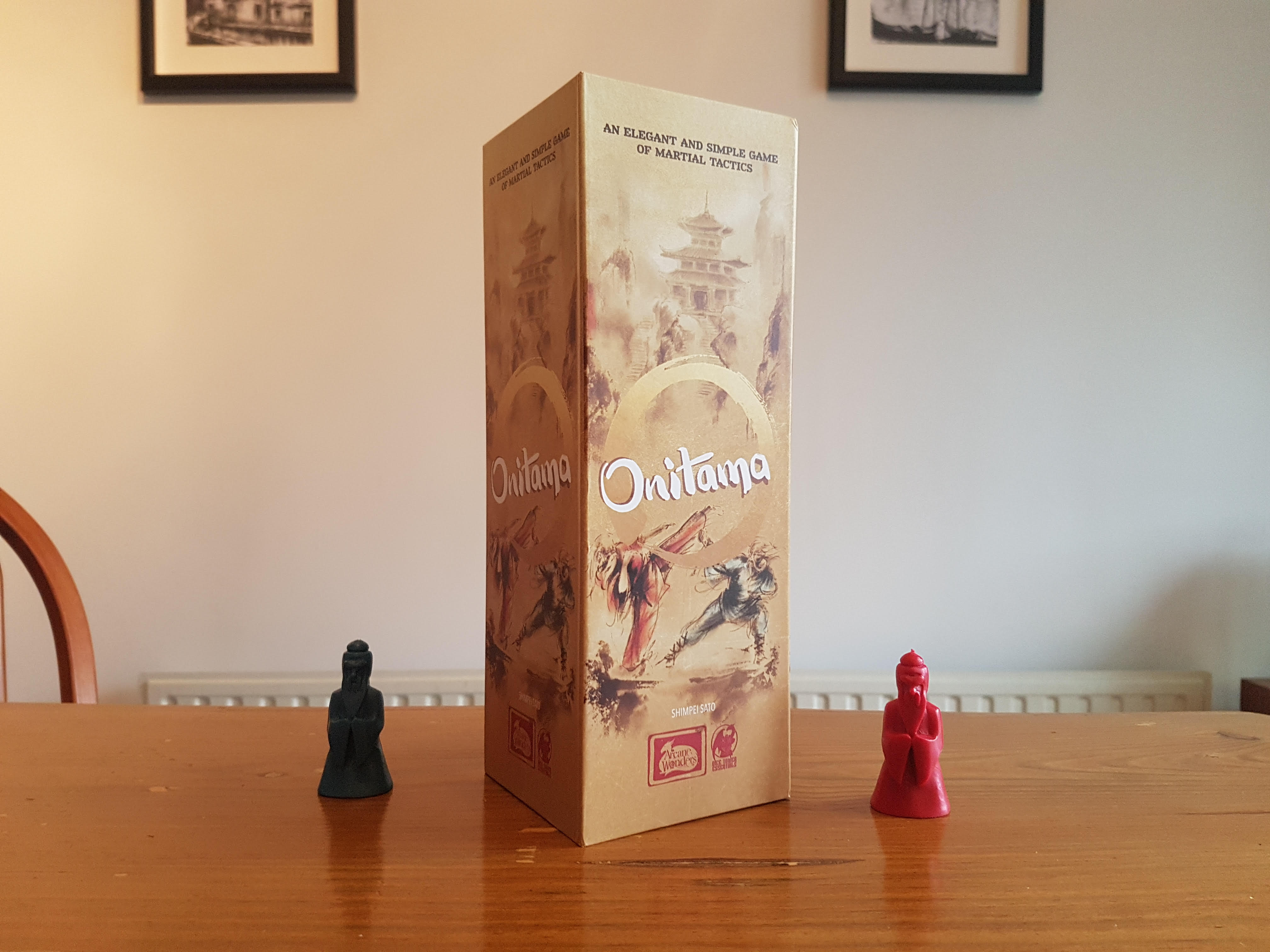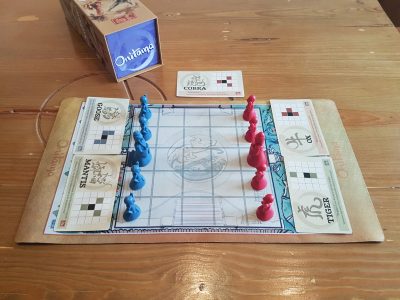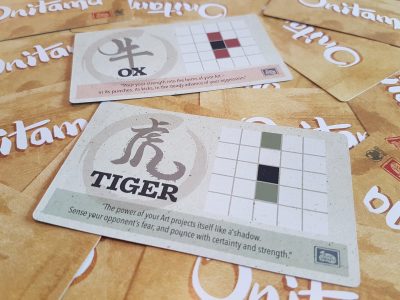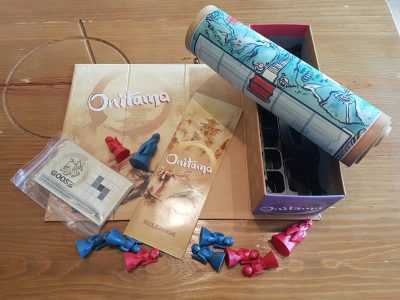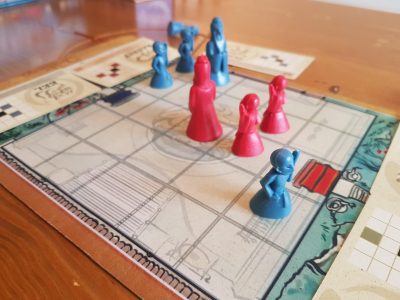Onitama is a grid based abstract strategy board game from designer Shimpei Sato and publisher Arcane Wonders. Released back in 2014, Onitama sees two players controlling pawns on a 5×5 grid. With a Japanese theme the game is an abstracted martial arts contest, between two groups of students and masters. Sporting the Dice Tower Essentials logo my hopes were high going into the game. However, did it live up to the hype? Let’s find out!
Setup of Onitama is lightning fast. Grab the rolled-up board from the box, place the 4 student pawns and Master pawn of each team at opposite ends of the 5 x 5 grid: arranging these pieces in a 212 line-up, so the master pawn is in the middle. Now, shuffle the deck of spirit (movement) cards and deal two cards faceup to each player. A fifth card is then revealed, with a coloured symbol revealing the starting player and being placed to their right. Taking around 30 seconds the game is now completely set up and ready to go.
On a turn players will choose from one of their two available spirit cards, with the third card to their right showing them what will become available to them next turn. These cards show unique movements that can be played on any of your pieces. They indicate from a starting position where on the grid a pawn could move to. Once a pawn and card combination have been selected the player makes a move as denoted on the spirit card and then places the card to the right of their opponent, making it their third “next round” card.
Each turn players must if possible play one of their cards no matter how negative an outcome it will cause. If none of the movement options on the spirit cards in your possession are possible, then you are forced to pass. You’ll still choose a spirit card to “play” and pass on, though no movement will occur. This is extremely rare, to the extent after countless games I’ve yet to see this rule ever come into effect.
If you move a pawn onto a space with an opponent’s piece, that unit is captured and removed from play. There are some intuitive limitations to movement, that anyone familiar with the likes of Chess or Checkers will most probably just assume. A player cannot take a movement that would result in a pawn ending off the board or on a space of another friendly pawn. Play continues back and fourth between players, moving pieces around the small grid until an end game condition is met.
There are two ways to win, and by extension lose, a game of Onitama: Way of the Stream and Way of the Stone. The Stream victory sees a player managing to move their master up the board and onto the space where their opponents master started the game. Simply getting to this space wins you the game, though naturally it is far from simple to pull off. The reason it is hard to do is because the second way to win, Stone. This victory condition is to capture your opponent’s master, by moving any piece onto its space. This makes it dangerous to sprint your master piece up the board, closer to your opponent’s pawns.
With 16 movement cards included in the box, and only 5 used per game, it can take a lot of games to start to see commonly used combinations. This variety and difference from game to game, keeps the game fresh for longer and massively increases the replayability. As games are played out relatively fast, and are short in length, having this heightened replayability is a necessity. Even using the same movement cards but starting with them in a different combination can see a game play out in a different way, let alone when you swap one or even all of the cards.
Onitama is a very portable board game. The box is relatively small, not taking up much more room than a slightly plump wine bottle, meaning it is ideal for being thrown (carefully placed) into a bag, to take to a friend’s house or for a hotel stay. Although the game itself demands a little table space the room isn’t as much as most board-based games, though was more than I had anticipated. Often places like hotels have a side table or desk and this would be plenty of room. For reference, all the table space needed is around 50 x 25cm.
Going hand in hand with this portability is the amount of time a game of Onitama takes to play, enabling players of an evening to play a few rounds and pack it away. With limited actions to select from, and no special powers for different pieces, it is hard to see how analysis paralysis could creep into a game. Even when playing with the worst offenders it never truly disrupts the experience. Within approximately 15 minutes you’ll have unboxed the game, comfortably played a round, had time to discuss what occurred and still have time to pack the game away neatly into the box. This speed makes it super easy to get Onitama to the table and not have it sat on your shelf of shame.
I must admit I was initially surprised when I opened the box to see the size of the components, it could be made much smaller. Nevertheless, the quality of the components as a result are phenomenal. Instead of a solid board a playmat, made of similar robust material to a mouse mat, is rolled inside the box. The cards are full size making them clear and easy to read for all players and then there are the pawns, that have a bit of chunkiness to them which feels nice to the touch.
Player experience does show somewhat when relatively new at the title, though this rather quickly ebbs away. Simple mistakes will be made in early games, as less pawn dancing takes place, often resulting in someone moving their master into a space their opponent can capture it on. I seemed to make these mistakes more than most, almost rushing moves via tunnel vision from seeing a way to win. Read the game correctly and these mistakes will start to slip out of your plays.
Onitama is a small box game, that packs a true punch of content. It isn’t often a game of this size can deliver on so many fronts, having the content that players will want to keep playing and having a production value that is surprisingly stunning. Many short length games struggle to captivate players for longer periods of time, falling into the filler category. While Onitama could be used in this way it is extremely easy to fall into the trap of “just one more round”, leading to an hour being easily spent. As every spirit card is unique the game continues to feel fresh and will undoubtedly continue to hit my gaming table throughout the year!
[Editor’s Note: Onitama was provided to us by Asmodee UK for review purposes. The game is currently available on 365 Games for £24.99. It is also available from local UK board game stores, find your local store here]

